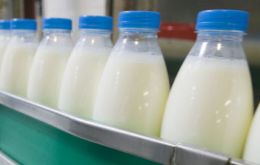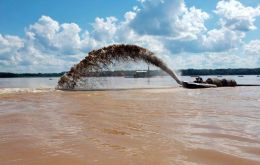MercoPress. South Atlantic News Agency
Brazil
-
Wednesday, October 11th 2023 - 08:21 UTC
TSE trial of Bolsonaro adjourned

Brazil's Superior Electoral Court (TSE) Tuesday adjourned the trial of former President Jair Bolsonaro, who is believed to have abused his political power ahead of last year's elections which he eventually lost to Luiz Inácio Lula da Silva, Agencia Brasil reported.
-
Tuesday, October 10th 2023 - 08:23 UTC
First Brazilian Air Force rescue aircraft due in Tel Aviv Tuesday

A Brazilian Air Force (FAB) Airbus 330-200 transport aircraft which can accommodate up to 230 passengers was already in Rome Monday, from where it planned to fly to Tel Aviv to bring the first batch of nationals of the South American country to safety from war-torn Israel, Agencia Brasil reported.
-
Monday, October 9th 2023 - 10:41 UTC
Israel: 260 bodies found at Brazilian rave after Hamas attack

Some 260 bodies were found at the site of a Brazilian music festival in southern Israel attacked by Hamas on Saturday, the Zaka search and rescue organization told local media.
-
Saturday, October 7th 2023 - 09:14 UTC
False bomb threats affect flights from Sao Paulo to Buenos Aires

Argentina's Airport Security Police (PSA) Friday enacted its explosives deactivation protocol at Buenos Aires' Aeroparque Jorge Newbery Airport after two flights inbound from Sao Paulo's Guarulhos were said to be carrying a bomb aboard each. Two simultaneous bomb threats were received at the Aeropuertos Argentina 2000 call center, it was reported.
-
Saturday, October 7th 2023 - 07:32 UTC
Argentina/Brazil bilateral trade continues to fall, contracting 19,5% in September

Trade between Argentina and Brazil reached US$ 2.1 billion in September, marking a 19.5% decline compared to the US$ 2.66 billion recorded in the same month last year. This fact was brought to attention in a report by Argentina’s Chamber of Commerce and Services (CAC), which used official data from Brazil.
-
Friday, October 6th 2023 - 08:45 UTC
Brazil and China conduct a landmark trade operation in Yuan and Reais

For the first time a trade operation between Brazil and China was conducted in a closed-loop system using local currencies, Yuans and Reais, without any involvement of US dollars. The transactions were financed and settled in yuan, directly converted into Brazilian real, without any involvement of the US dollar.
-
Thursday, October 5th 2023 - 10:59 UTC
Brazil reports record trade surplus in September

Thanks to lower fuel imports and improved grain harvest results, Brazil's Ministry of Development, Industry, Trade, and Services this week announced a trade surplus of $8.904 billion for September 2023, a 51.2% improvement over the same month last year, Agencia Brasil reported.
-
Wednesday, October 4th 2023 - 10:47 UTC
Severe drought and warm waters killing dolphins in the Amazon river basin

More than a hundred dolphins have been found dead in a tributary of Amazon river in Brazil this past week. Experts suspect the deaths may have been caused by severe drought and rising heat.
-
Wednesday, October 4th 2023 - 10:30 UTC
Brazil to drastically cut dairy imports from Mercosur and ease taxes to promote domestic production

Brazil is planning to curb dairy imports from Mercosur countries. In the next few days, a decree will be published that will change the rules for tax benefits for dairies, agro-industrial companies, and cooperatives that participate in the Ministry of Agriculture’s milk program PMLS. The objective is to reduce tax incentives for companies that purchase dairy products from abroad.
-
Tuesday, October 3rd 2023 - 20:15 UTC
Brazil to begin dredging stretches of the Amazon fluvial network because of the drought

Several Brazilian ministries have joined efforts in a desperate attempt to impede the gigantic Amazon basin and its fluvial network from continuing to lose water, result of a scorching drought and insufficient rainfall.
